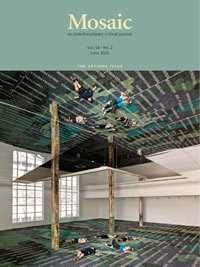Issue 54.2
Overview

Special Issue: The Archive Issue
Published: June 2021
View the issue introduction or see the issue summary and contents below.
12 essays, totalling 236 pages
$24.95 CAD
Mosaic issue 54.2 is a special archival issue developed as the first part of a collaborative project with the Dutch artist team Bik Van der Pol. Sifting through fifty odd years of old issues and forty times as many published essays, we selected twelve to republish. The second part of the project involves a series of lectures that will be published in a subsequent issue (55.1).
Chaos and FormErnst Fischer Abstract unavailable at this time. | |
Certain Assistances: The Utilities of Speculative Fiction in Shaping the FutureDonald L. Lawler Abstract unavailable at this time. | |
The End Once Again: Art and Politics at the Close of the CenturyCharles Molesworth Abstract unavailable at this time. | |
From Trauma to Paranoia: Nuclear Weapons, Science Fiction, and HistoryCyndy Hendershot Focusing on the ahistorical tendency in much science fiction, and placing it in the context of the political and scientific commentary on the Atomic Age, this essay explores the way that three science-fiction films of the 1950s resorted to paranoid defense-mechanisms in their attempt to deal with the trauma of nuclear destruction. | |
‘The Future is History’: 12 Monkeys and the Origins of AIDSDavid Lashmet Set at the start and end of an epidemic plague, Terry Gilliam’s 1996 film conflates schizophrenia, hypochondria, carceral confinement, and unregulated experimentation. But these timeless themes have a singular locus: the ultimate truth of a fictional virus. In turn, this locus positions 12 Monkeys in a historical frame: within contemporary discourse on the origin of AIDS. | |
Raven’s Plague: Pollution and Disease in Lee Maracle’s RavensongJudith Leggatt This essay examines the paradoxical construction of dirt and disease in Lee Maracle’s Ravensong. The diseases that infect the Salish and European-Canadian communities in the novel represent both bridges to communication between groups and the gulf that separates them. | |
Arrowsmith Goes Native: Medicine and Empire in Fiction and FilmLisa L. Lynch This essay examines how evolving perceptions of America’s role as a world power in the interwar period affect representations of medical research and practice. It argues that Sinclair Lewis’s novel Arrowsmith, and the film based on that novel, construct an imperial role for the United States in their depictions of American scientific medicine. | |
The Specter of History: Rethinking Thinking in the Post-Cold War AgeWilliam V. Spanos Countering the representation of the end of the Cold War as the end of History, this essay argues for the urgent need to think the positive, anti-imperialist, possibilities for thought and practice of the Heideggerian "Nothing" that, in different forms, haunts liberal capitalist democracy. | |
Foot in Mouth: Animals, Disease, and the Cannibal ComplexHelen Tiffin The world-wide panic occasioned by outbreaks of BSE was (and is) incommensurate with the number of human fatalities incurred. This apparent over-reaction can in part be accounted for by BSEs simultaneous disruption of cherished “boundaries” between those categories (civilization and savagery; cannibalism and carnivory; human and animal) upon which our human self-definition depends. | |
Ecology, Coloniality, Modernity: Argentine Fictions of Tierra del FuegoLaura Barbas Rhoden This study focuses on two Argentine novels: La tierra de fuego by Sylvia Iparraguirre and Un piano en Bahía Desolación by Libertad Demitrópulos. The essay examines the authors’ representations of the transformation of Tierra del Fuego during an era of nineteenth-century British colonialism and Argentine nation-formation. | |
Democracy, Climate Change, and Environmental JusticeMatthias Fritsch Taking its cue from Derrida’s rethinking of political life as lifedeath, this essay argues that taking turns helps in conceptualizing the intra- and inter-generationally shared nature of democratic institutions. However, the generational taking turns with democratic power must be thought in conjunction with an environmental turning: not only do human generations seek to share sovereignty over subjects and the earth, but such human sovereignty is dependent upon a lateral turning with the earth. | |
Henry David Thoreau on Spontaneous Order and its EnemiesThomas Peyser Henry David Thoreau portrayed social order as a spontaneous and evolving result of human interactions. Government, however, stymies evolution by imposing orders privileging goals like economic development. Thoreau encourages escape from “state space,” hoping individuals will chance upon new practices that might coalesce into the kernel of future orders. |